DWFI researching solutions, fostering communication regarding AltEn environmental crisis in Mead, Nebraska
Residents near Mead, Nebraska, noticed trouble about five years ago when they noticed a stench in the air, pets were becoming ill, and some Mead citizens reported headaches and nausea. Around that same time, UNL Entomologist Judy Wu-Smart, discovered her bee colonies were dying off in the area.
Many of them blamed AltEn, an ethanol-producing company that used seed coated with fungicides and insecticides, including those known as neonicotinoids, or “neonics,” in their production process. Neonics are chemicals used in plant protection products to control harmful insects. The name literally means "new nicotine-like insecticides.”
AltEn sold some of its waste, also known as “wetcake” to farmers as a soil conditioner and distributed the waste across acres of farmland near Mead. The remaining wetcake – some 84,000 tons – was stored as uncovered piles and, in some cases, allowing residues to leach into the soil and potentially reach groundwater.
The Nebraska Department of Environment and Energy (NDEE) ordered AltEn to cease operations on February 4, 2021. A week later, plant officials reported an accidental spill from a burst pipe that released more than 4 million gallons of wastewater into the surrounding farmland, which, in turn, washed out manure from a nearby feedlot, adding to the contamination. Some of this wastewater release reached the University of Nebraska Eastern Nebraska Research and Extension Center.
Dean Ali Khan of the College of Public Health UNMC, quickly responded to the unfolding crisis and contacted College of Public Health and other DWFI faculty and staff to research the problem and formulate solutions in collaboration with the Mead community and local area governmental departments.
Dean Khan formed a team with Water Sciences Lab Director Dan Snow, DWFI Director of Water, Climate and Health Jesse Bell (also Claire M. Hubbard professor of health and environment at UNMC) and DWFI Faculty Fellows Eleanor Rogan, Shannon Bartelt-Hunt and Liz VanWormer to study to possible environmental effects of AltEn’s contaminated seed storage and waste spill. In June of this year, along with Judy Wu-Smart, they presented to a group of about 50 community members at a Mead Town Hall session.
The team is particularly concerned with exposure to neurotoxic residues from the neonicotinoid insecticides. “[It] raises the level of concern, particularly for infants and children, that they might experience some neurological problem with this. That would be my big concern," said Rogan.
-
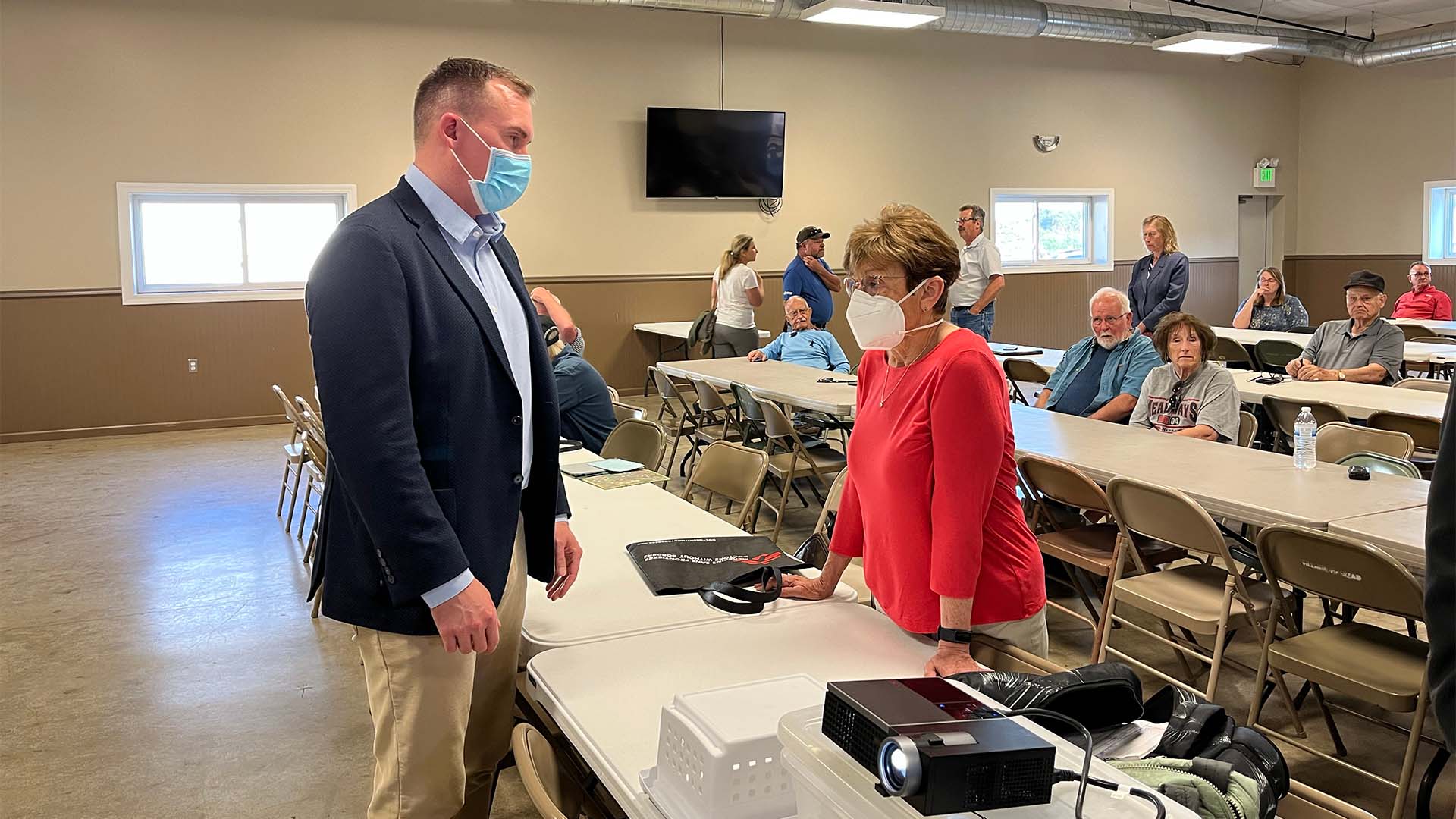
The research team shared preliminary findings from their study about the possible effects from the ethanol plant at a town hall meeting in Mead, Nebraska in June 2022. Photo credit: UNMC
-
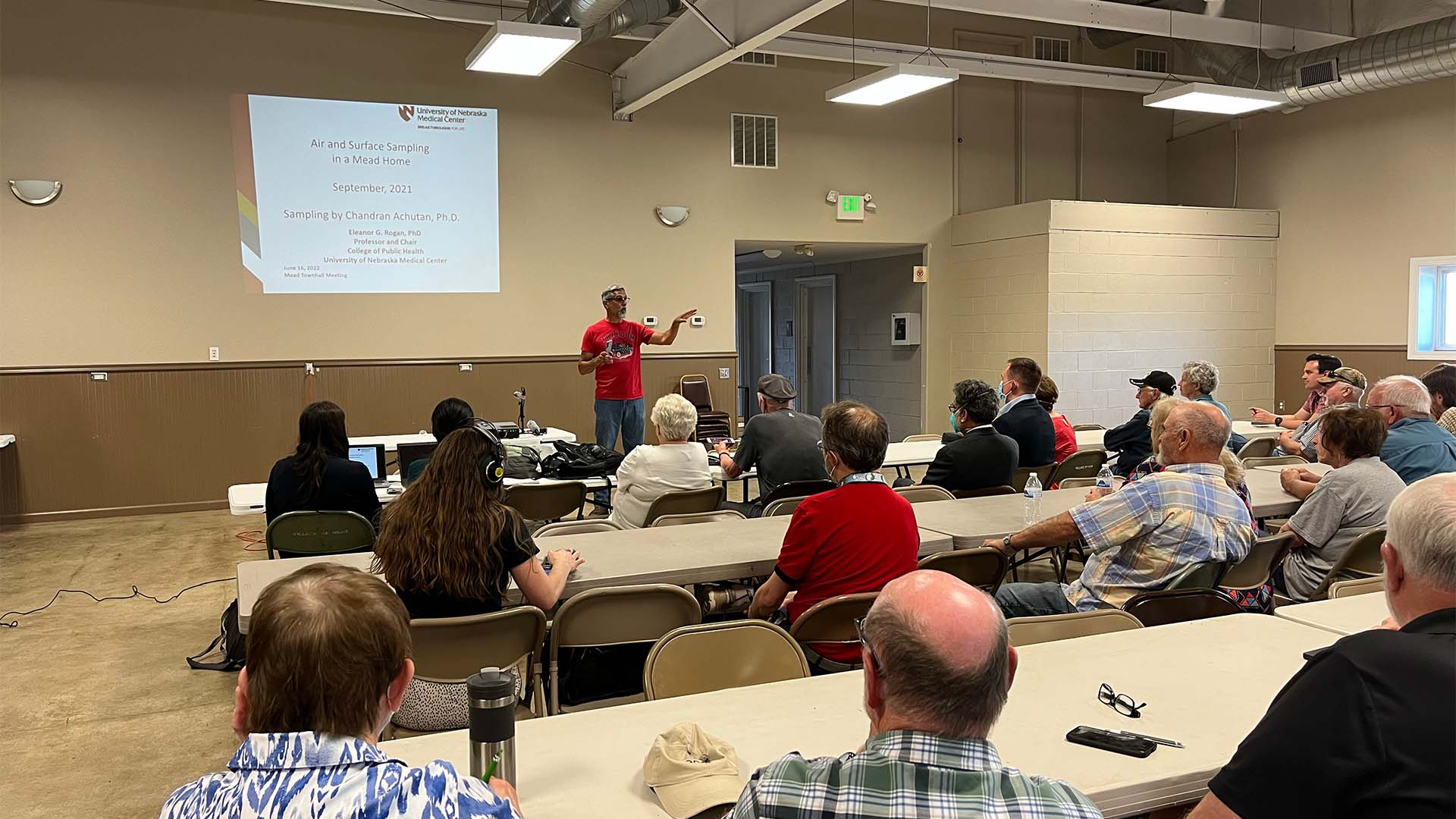
The research team shared preliminary findings from their study about the possible effects from the ethanol plant at a town hall meeting in Mead, Nebraska in June 2022. Photo credit: UNMC
-
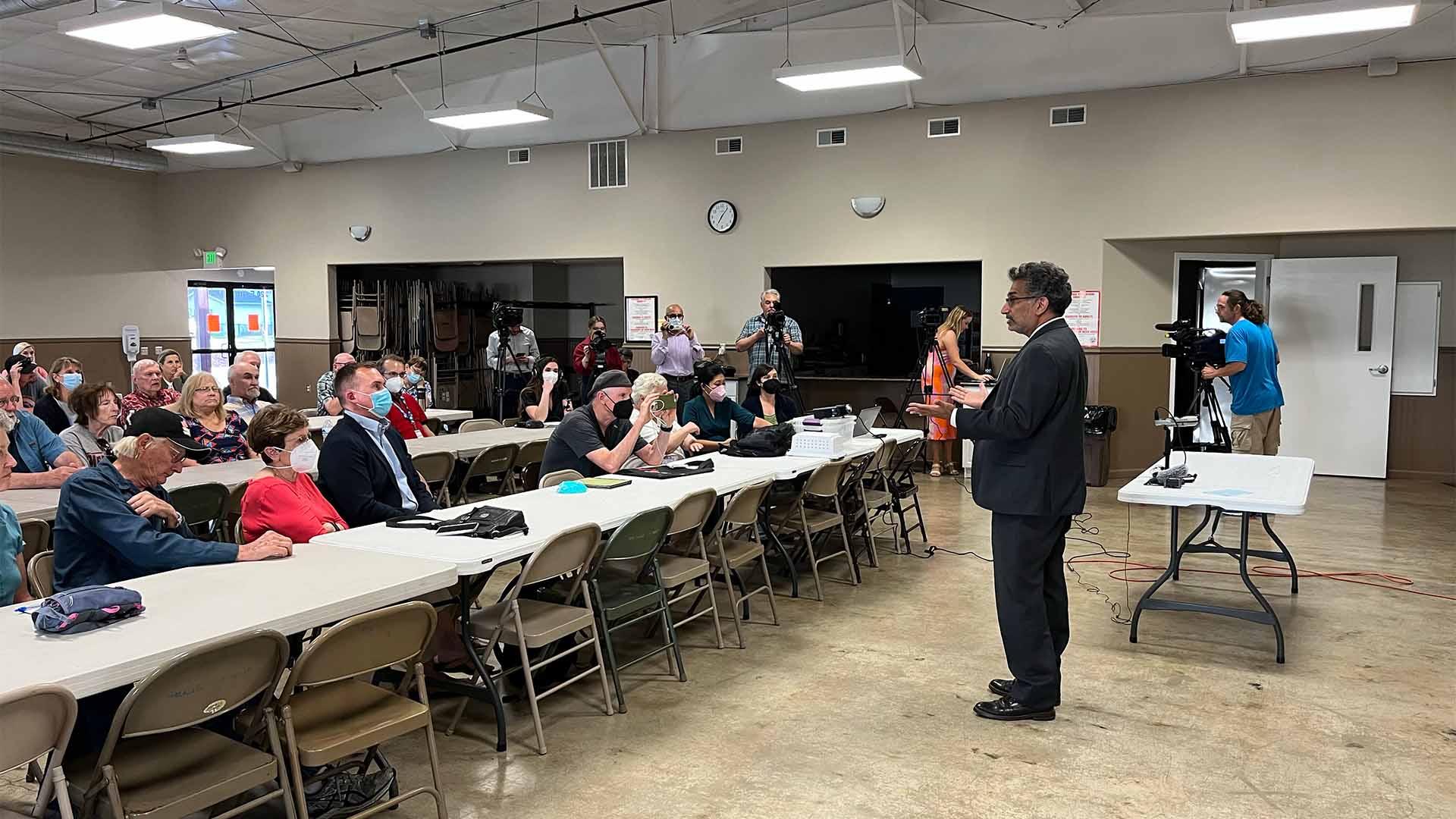
The research team shared preliminary findings from their study about the possible effects from the ethanol plant at a town hall meeting in Mead, Nebraska in June 2022. Photo credit: UNMC
-
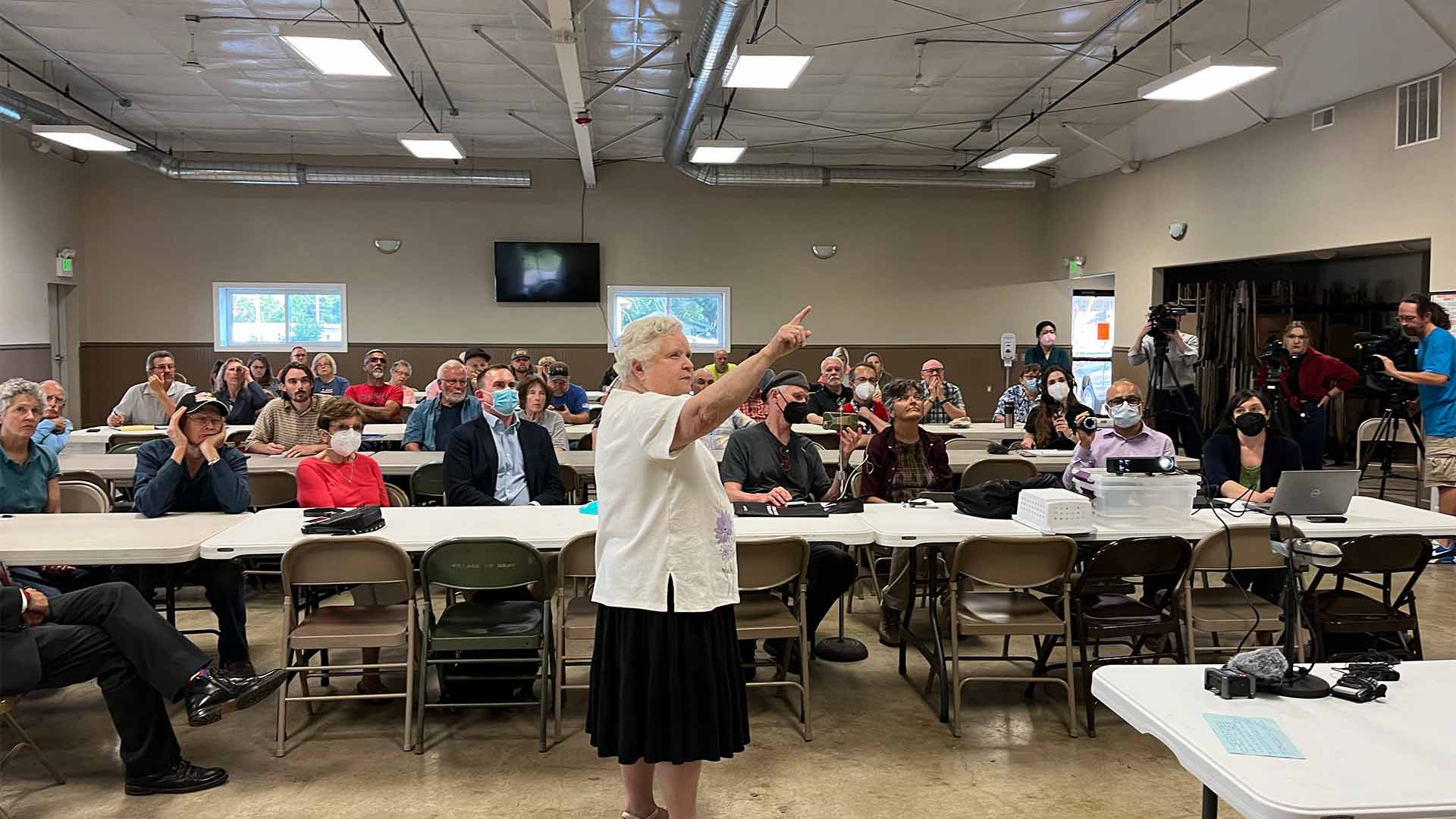
The research team shared preliminary findings from their study about the possible effects from the ethanol plant at a town hall meeting in Mead, Nebraska in June 2022. Photo credit: UNMC
-
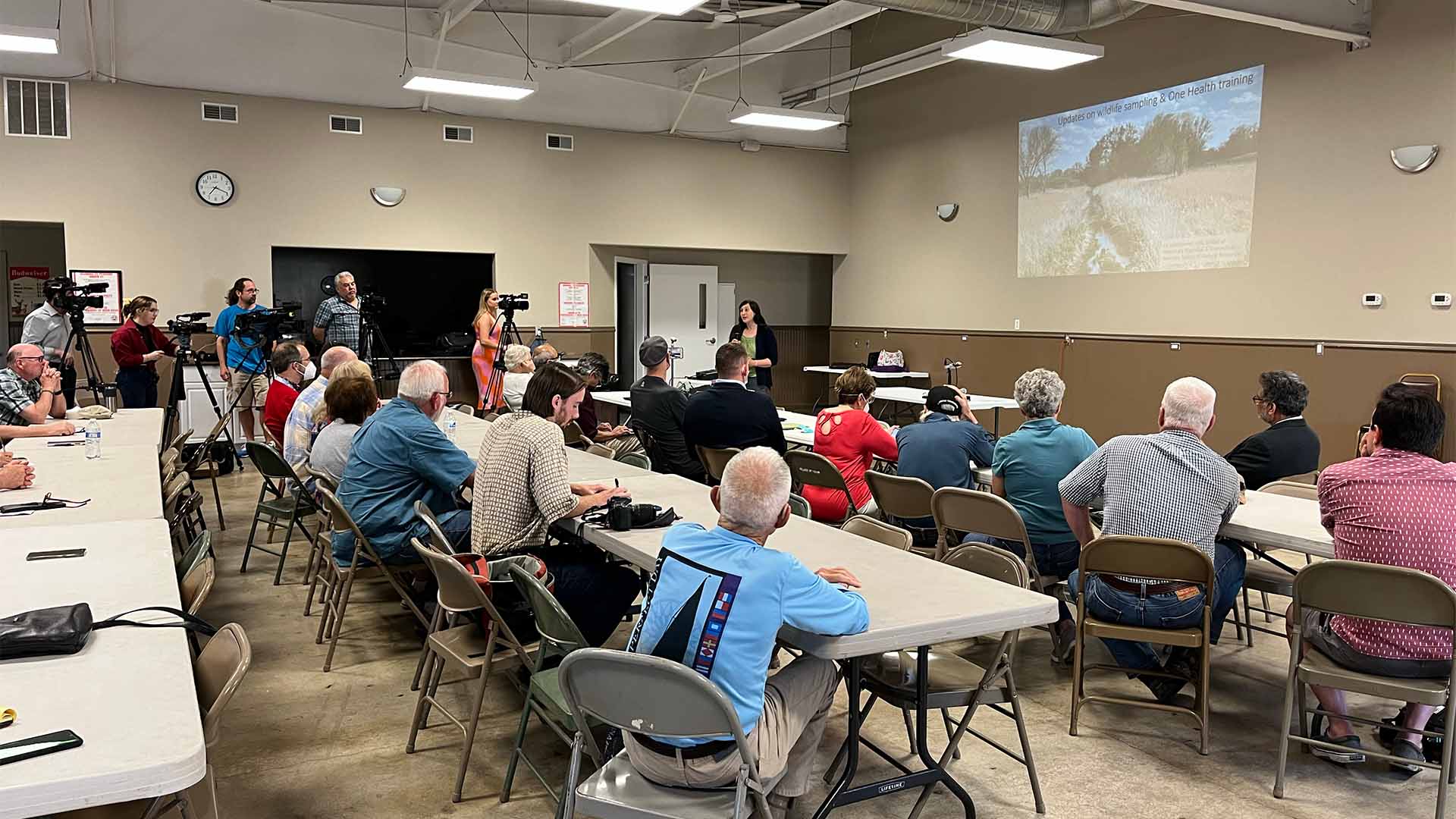
The research team shared preliminary findings from their study about the possible effects from the ethanol plant at a town hall meeting in Mead, Nebraska in June 2022. Photo credit: UNMC
-
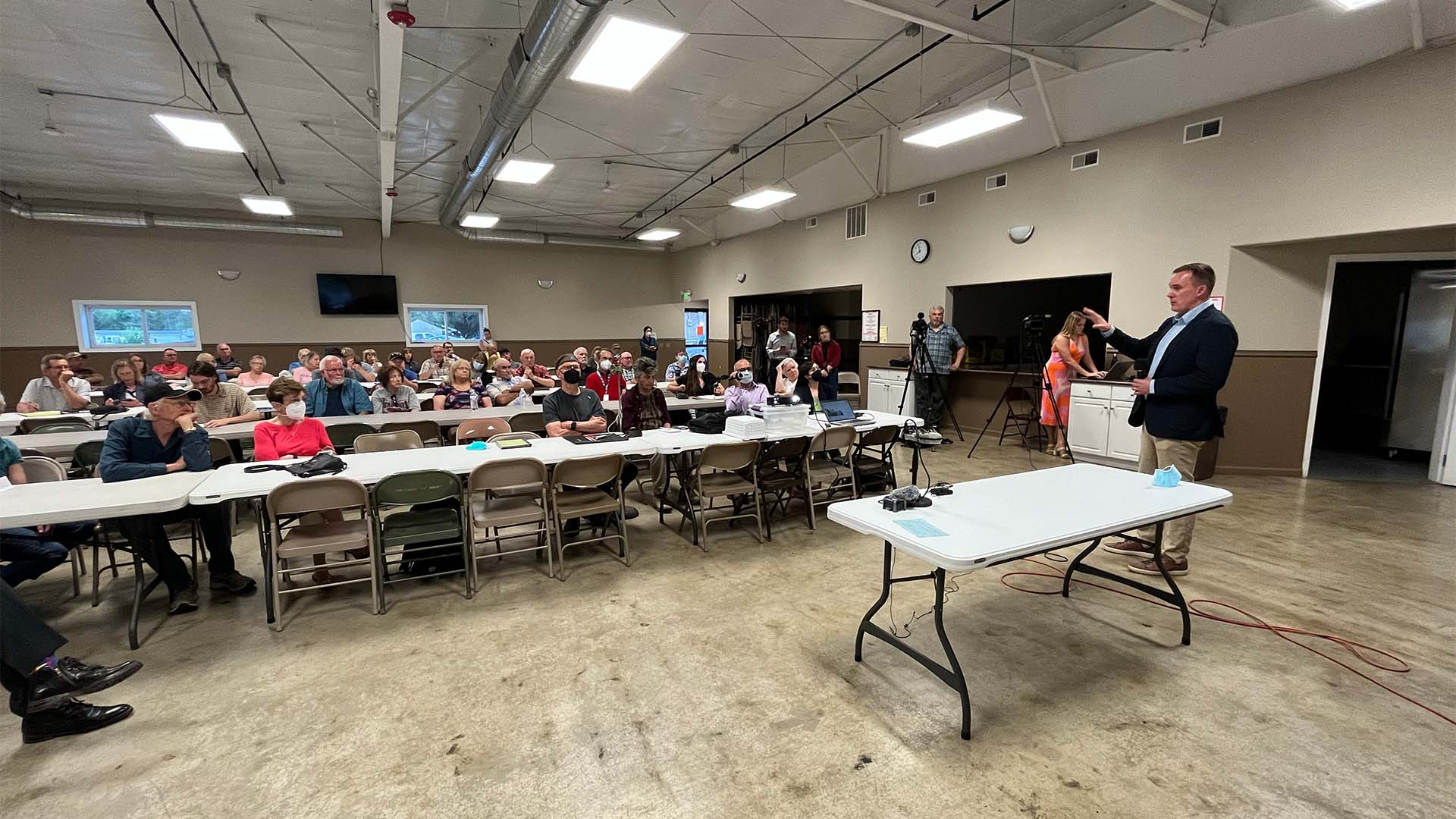
The research team shared preliminary findings from their study about the possible effects from the ethanol plant at a town hall meeting in Mead, Nebraska in June 2022. Photo credit: UNMC
-
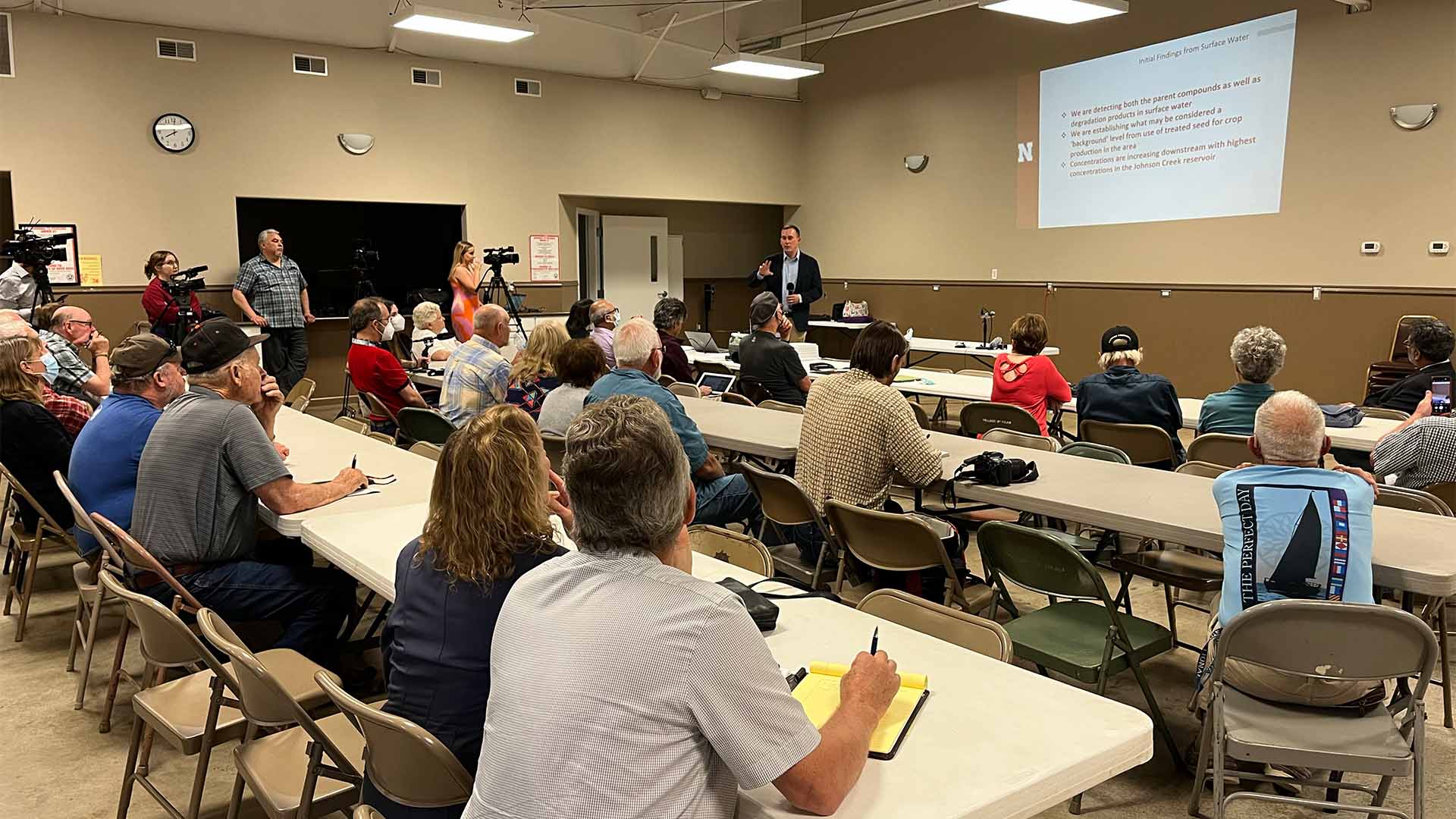
The research team shared preliminary findings from their study about the possible effects from the ethanol plant at a town hall meeting in Mead, Nebraska in June 2022. Photo credit: UNMC
Community members also voiced their worries about the surrounding streams and wildlife, which members say have been negatively impacted with a reduction in plant and animal life. In addition to homes, the research team is also sampling the water, soil, air and small animals.
“We are hoping to better understand the longer-term impact of neonics,” said Bell. “These chemicals bio-accumulate. And when they break down, we don’t know what secondary compounds are being produced and what their effects are.”
The DWFI team mailed a survey on perceived health impacts to 1,000 people in the surrounding community. The team also hopes to begin a medical registry that will follow willing participants for at least ten years, starting in January.
“The information we collect will be valuable to determine how these fungicides can affect the environment in general,” said Snow. “The broader issue of understanding neonics will help us develop plans for future prevention and mitigation of this sort of contamination.”
This work is part of UNMC’s partnership with DWFI to assess water quality impacts on health, and the start of the project was funded by the Claire M. Hubbard foundation. The State of Nebraska allocated an additional $1 million to the NU team to continue its water and environmental research in the Mead area.
FY 2022 Annual Report
- Overview
- Letter from the Executive Director
-
Research and Policy
-
Nebraska + Regional
- DWFI offers suite of tools to improve irrigation water use and agricultural productivity
- Understanding groundwater markets and transfers in Nebraska
- Water management for improving water use, sustainability
- Research looks to control nitrate leaching, protect Nebraska groundwater
- DWFI researching solutions, fostering communication regarding AltEn environmental crisis in Mead, Nebraska
- Nitrate Strategy Groups release calls for action
- Mapping geographic heat inequities in urban areas
-
Global + National
- New report explores the business ecosystem for smallholder irrigation in Rwanda
- Visit to Nebraska results in water management partnership with Brazil
- New study shows economic impact of the irrigation equipment and services industry
- DWFI and Mammoth Water launch report of water market readiness
- USDA partnering with Nebraska Water Center to enhance modeling system
- Faculty Fellows
-
Supported Students
- Water for Food Research Forum showcases exciting student work
- DWFI welcomes new round of student support recipients
- Student's fertigation startup awarded first Husker Venture Fund investment
- Four DWFI supported students receive doctoral degrees
- Nebraska researchers are following the water
- Heeren Inspires Students through Irrigation Field Course
-
Nebraska + Regional
-
Communication, Education + Outreach
- DWFI reconnects with international partners and projects
- Nebraska Water Center seminars focus on hydro-tourism, economic development in Nebraska
- Nebraska Water Center conference held in Scottsbluff
- Virtual forum broadens institute’s reach
- Aquifer recharge project in Nebraska featured in international publication
- Digital growth: Water for Food Podcast and online engagement
- Development
-
Photo essays
- DWFI discusses water management with delegation from Kenya
- DWFI and Nebraska Water Center engage with attendees at UNL East Campus Discovery Days
- DWFI and Nebraska Water Center participate in UNL Sustainability Kickoff event
- DWFI hosts students Faculty Fellow for fall welcome event
- DWFI sponsors annual Earthstock event on University of Nebraska Lincoln campus
- Resources
- Search
FY 2022 Annual Report
- Overview
- Letter from the Executive Director
-
Research and Policy
-
Nebraska + Regional
- DWFI offers suite of tools to improve irrigation water use and agricultural productivity
- Understanding groundwater markets and transfers in Nebraska
- Water management for improving water use, sustainability
- Research looks to control nitrate leaching, protect Nebraska groundwater
- DWFI researching solutions, fostering communication regarding AltEn environmental crisis in Mead, Nebraska
- Nitrate Strategy Groups release calls for action
- Mapping geographic heat inequities in urban areas
-
Global + National
- New report explores the business ecosystem for smallholder irrigation in Rwanda
- Visit to Nebraska results in water management partnership with Brazil
- New study shows economic impact of the irrigation equipment and services industry
- DWFI and Mammoth Water launch report of water market readiness
- USDA partnering with Nebraska Water Center to enhance modeling system
- Faculty Fellows
-
Supported Students
- Water for Food Research Forum showcases exciting student work
- DWFI welcomes new round of student support recipients
- Student's fertigation startup awarded first Husker Venture Fund investment
- Four DWFI supported students receive doctoral degrees
- Nebraska researchers are following the water
- Heeren Inspires Students through Irrigation Field Course
-
Nebraska + Regional
-
Communication, Education + Outreach
- DWFI reconnects with international partners and projects
- Nebraska Water Center seminars focus on hydro-tourism, economic development in Nebraska
- Nebraska Water Center conference held in Scottsbluff
- Virtual forum broadens institute’s reach
- Aquifer recharge project in Nebraska featured in international publication
- Digital growth: Water for Food Podcast and online engagement
- Development
-
Photo essays
- DWFI discusses water management with delegation from Kenya
- DWFI and Nebraska Water Center engage with attendees at UNL East Campus Discovery Days
- DWFI and Nebraska Water Center participate in UNL Sustainability Kickoff event
- DWFI hosts students Faculty Fellow for fall welcome event
- DWFI sponsors annual Earthstock event on University of Nebraska Lincoln campus
- Resources
- Search
Related Articles
Nebraska Water Center seminars focus on hydro-tourism, economic development in Nebraska
The Nebraska Water Center, in partnership with the University of Nebraska–Lincoln’s School of Natural Resources, hosted its 2022 Spring Seminar Series online and in person.
Nebraska Water Center conference held in Scottsbluff
The Nebraska Water Center (NWC) trekked across the state to host its annual Nebraska Water Conference in 2021.
Aquifer recharge project in Nebraska featured in international publication
A new book published by UNESCO includes a project from Nebraska’s Central Platte Valley as a case study in effective managed aquifer recharge (MAR).
COOKIE USAGE:
The University of Nebraska System uses cookies to give you the best online experience. By clicking "I Agree" and/or continuing to use this website without adjusting your browser settings, you accept the use of cookies.

